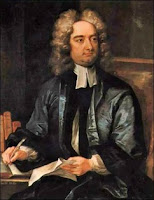Gulliver's Travels
by Jonathan Swift
(PDF)
(Audio Book)
FOREWORD BY OLIVIA SALTER
In the vast landscape of literature, few works have captivated readers with their boundless imagination and satirical wit quite like Jonathan Swift's timeless masterpiece, Gulliver's Travels. Originally published in 1726, this extraordinary tale takes its readers on an extraordinary journey through lands both fantastical and thought-provoking. Swift, a master of satire, skillfully weaves together elements of adventure, social critique, and philosophical contemplation, creating a work that stands as a testament to the power of literature to challenge societal norms and provoke introspection.
Gulliver's Travels introduces us to Lemuel Gulliver, a ship's surgeon, who embarks on a series of remarkable voyages. From the land of Lilliput inhabited by miniature people to the towering giants of Brobdingnag and from the floating island of Laputa to the primitive and bestial society of the Houyhnhnms, Gulliver's encounters with these diverse civilizations illuminate Swift's biting commentary on the human condition. Through the lens of their peculiarities and absurdities, Swift holds up a mirror to his readers, forcing them to confront their own flawed nature, societal constructs, and the follies of the world.
Swift's narrative genius lies not only in his inventive landscapes and curious creatures but also in his ability to use these imaginative settings to explore timeless truths about humanity. Through his protagonist, Gulliver, we witness the clash of cultures and the often humorous consequences that arise from these encounters. Swift deftly employs irony and parody to expose the inherent flaws and absurdities of human society, inviting readers to question the conventions and institutions that govern their lives. His caustic social commentary challenges the status quo and deconstructs prevailing ideas of power, government, religion, and humanity itself.
Gulliver's Travels is a work that transcends time, remaining relevant and provocative in every era it graces. Swift's sharp wit and incisive observations of human behavior continue to resonate, serving as a reminder that societies are bound to repeat their mistakes if they remain unaware of their flaws. In the absurdity and exaggeration of his satirical universe, Swift invites us to examine our own world critically and to question the prevailing wisdom that may lead us astray.
With this edition of Gulliver's Travels, readers both new and familiar have the opportunity to embark on this extraordinary odyssey once more. As we delve into Swift's enchanting narratives and thought-provoking allegories, let us not only revel in the sheer entertainment the tale provides but also embrace its underlying messages. Gulliver's Travels is a timeless classic that serves as a reminder to question the world around us, challenge established norms, and strive for a more enlightened and compassionate society.
May this journey through Jonathan Swift's remarkable imagination inspire you to view the world with fresh eyes and to recognize the power of literature as a catalyst for change. As we embark on this adventure with Gulliver, let us remember that the most extraordinary voyages often begin within the depths of our own minds as we dare to challenge the limitations of our own understanding.
Olivia Salter
09/20/2022
Gulliver's
Travels, or Travels into Several Remote Nations of the World. In Four
Parts. By Lemuel Gulliver, First a Surgeon, and then a Captain of
Several Ships is a 1726 prose satire by the Irish writer and
clergyman Jonathan Swift, satirising both human nature and the
"travellers' tales" literary subgenre. It is Swift's best known
full-length work, and a classic of English literature. Swift claimed
that he wrote Gulliver's Travels "to vex the world rather than divert
it". Wikipedia
Jonathan Swift Books at Amazon Jonathan Swift Books at Amazon
The PDF might take a minute to load. Or, click to download PDF.
If your Web browser is not configured to display PDF files. No worries, just click here to download the PDF file.
Jonathan Swift Books at Amazon Jonathan Swift Books at Amazon
About the Author
Born in 1667, Jonathan Swift was an Irish writer and cleric, best
known for his works Gulliver s Travels, A Modest Proposal, and A Journal
to Stella, amongst many others. Educated at Trinity College in Dublin,
Swift received his Doctor of Divinity in February 1702, and eventually
became Dean of St. Patrick s Cathedral in Dublin. Publishing under the
names of Lemeul Gulliver, Isaac Bickerstaff, and M. B. Drapier, Swift
was a prolific writer who, in addition to his prose works, composed
poetry, essays, and political pamphlets for both the Whigs and the
Tories, and is considered to be one of the foremost English-language
satirists, mastering both the Horatian and Juvenalian styles. Swift died
in 1745, leaving the bulk of his fortune to found St. Patrick s
Hospital for Imbeciles, a hospital for the mentally ill, which continues
to operate as a psychiatric hospital today.Jonathan Swift(1667 1745), a poet, satirist, and clergyman, published many satirical works, among them A Modest Proposal. Robert DeMaria, Jr. is Henry Noble McCracken Professor of English at Vassar College. He has published widely on seventeenth- and eighteenth-century literature
Jonathan Swift Books at Amazon Jonathan Swift Books at Amazon


No comments:
Post a Comment